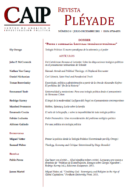Eschatology, politics and administration in the framework of Alexandre Kojève’s work: the problem of “the end of history”

Published 2021-07-13
Keywords
- eschatology,
- Kojève,
- administration,
- Taubes
How to Cite

This work is licensed under a Creative Commons Attribution-NonCommercial 4.0 International License.
Abstract
The aim of this article is to explore the theological matrices underlying the debates about the end of history –and the end of politics– also looking in depth at the theological fundamentals of the triumph of economics and administration over politics in the contemporary scene. Regarding this, Alexandre Kojève’s work has been more than relevant in order to revisit that fundamental relation between theology and politics, which influences, even if only in the shasdows, modern thought. In this sense, this article takes into account the eschatological imprints in such an heretic work as the one from Alexandre Kojève (an author to whom Giorgio Agamben owes more than he is willing to accept). Because if, as the former points out, history has reached its end –a notion that Francis Fukuyama later popularized– then the only thing left to do is the economical administration of the existing.